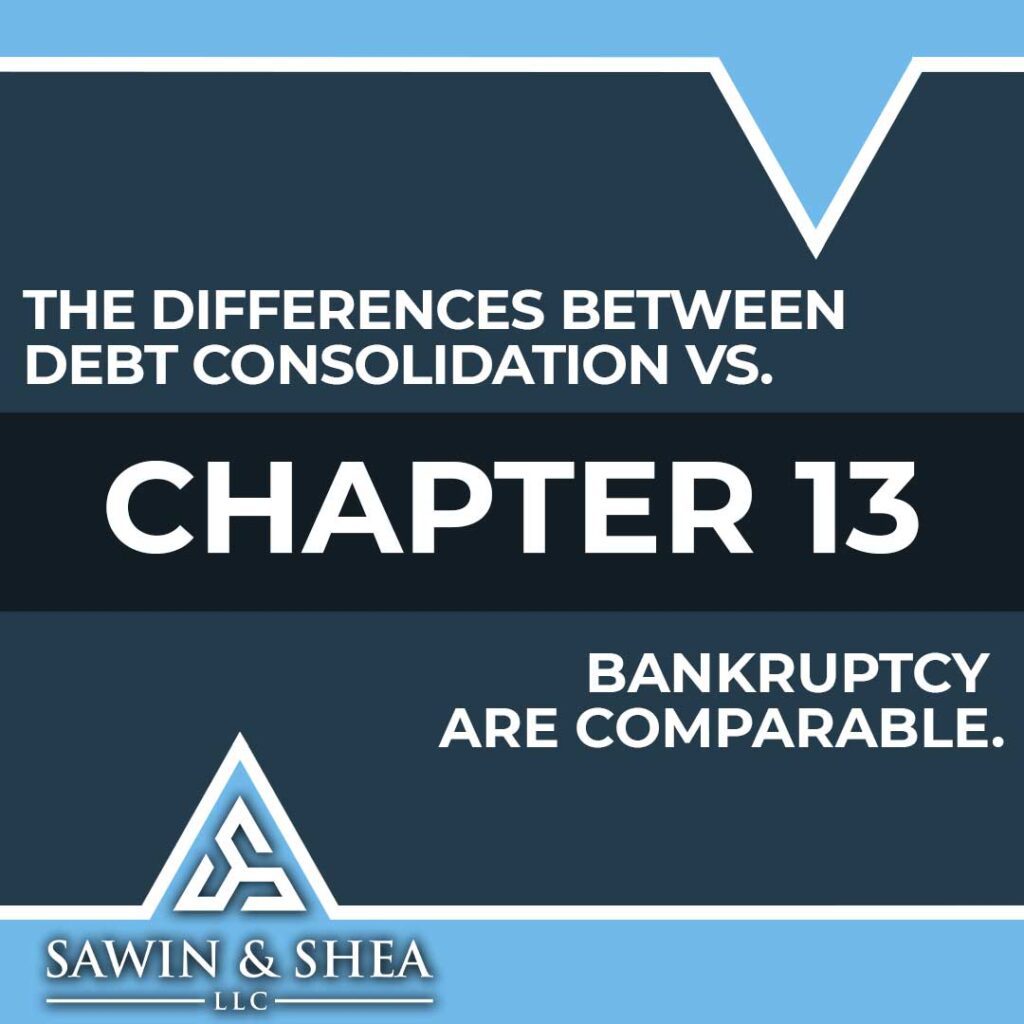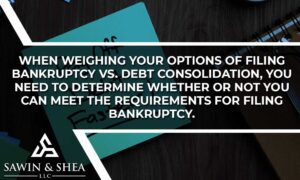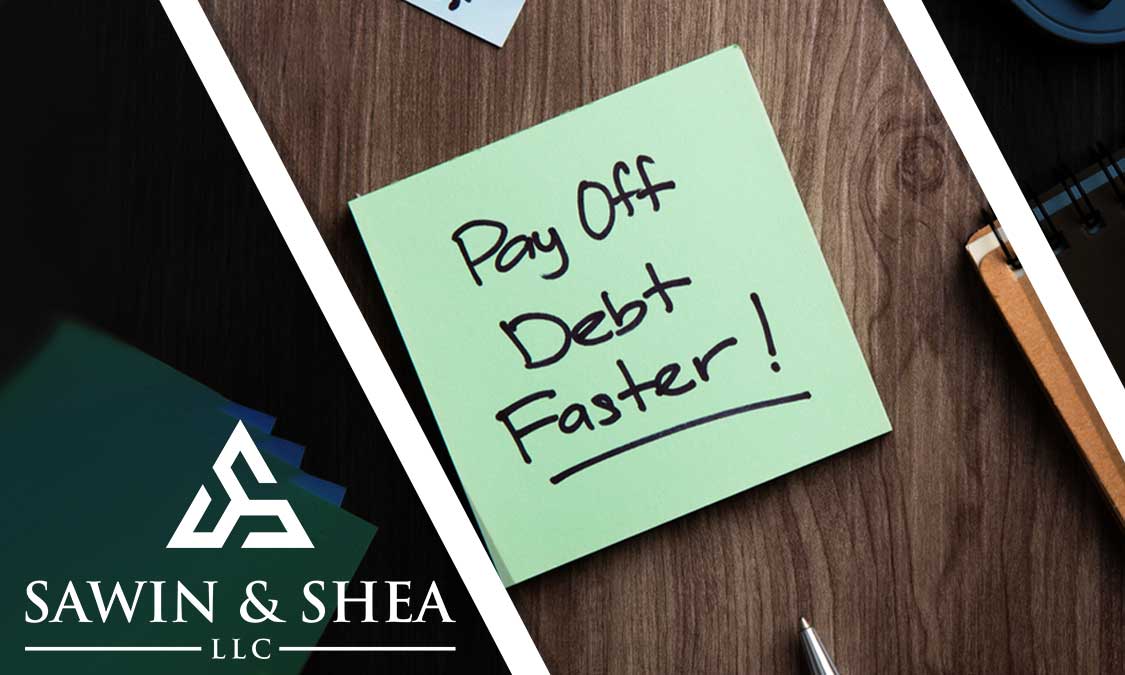
Being overwhelmed by debt is a stressful situation that can make it challenging to decide on the best path forward. Two of the most common options for dealing with unmanageable debt are filing for bankruptcy and pursuing debt consolidation. However, the choice between these two approaches depends greatly on individual circumstances.
Bankruptcy and debt consolidation are distinct solutions, each with advantages and potential drawbacks. Before making a decision, you should carefully evaluate your options based on your financial situation, income level, credit history, and types of debt.
If you are uncertain about your options, speaking with a financial advisor or an experienced bankruptcy attorney can help.
Understanding Debt Consolidation
Debt consolidation is the process of taking out a brand-new loan and using the money to pay off other loans or debts. This strategy is usually used to combine multiple monthly payments into one monthly payment.
Pros & Cons of Debt Consolidation
Debt consolidation can be great if you qualify for a loan with a low enough interest rate. It simplifies your payments, and many people save money with this approach. Debt consolidation will likely have a short-term impact on your credit score, but it should recover as you begin making payments.
However, it’s important to remember that this does not eliminate debt. You still owe everything you owed before– you just have a new lender to repay. Also, if your credit score is already quite low, you may not be able to qualify for low interest which makes debt consolidation a useful method of debt management.
How Does Debt Consolidation Work?
There are a few different methods of debt consolidation, including:
- Balance transfer credit cards
- Debt consolidation loan
- Debt management through a credit counseling agency
Debt Management Programs
Debt management programs promise to help people deal with debt by collecting monthly payments from their clients and paying debts off when the money they collected reaches an amount sufficient to negotiate a settlement with a credit card or loan company. The issue with these programs is that they are voluntary. Creditors do not have to participate. If the creditor tires of waiting for payments they can pursue legal remedies like lawsuits. Your credit also continues to get damaged while you are in the program as you miss monthly payments to the creditors. We regularly see people who have lost time, money, and points on their credit score only to get sued and be faced with garnishments while in these programs.
Understanding Bankruptcy
Bankruptcy is a legal process that allows individuals who are unable to pay their debts to seek relief from their creditors under the protection of federal bankruptcy courts.
It provides a way for debtors to either liquidate non-exempt assets (most cases result in a no-asset finding, meaning people keep everything they have) to pay off creditors and eliminate remaining debts (Chapter 7 bankruptcy) or to reorganize their finances and debts into a multi-year repayment plan (Chapter 13 bankruptcy).
Pros & Cons of Bankruptcy
Bankruptcy, like other methods of debt management, has its benefits and drawbacks.
It offers debtors a fresh start by eliminating their debt, except for some non-dischargeable debts like student loans or child support
Different types of bankruptcy meet different criteria, and you aren’t forced into just one kind of bankruptcy if you choose to file. A bankruptcy attorney can help you determine the best kind of bankruptcy filing for your circumstances.
Types of Bankruptcy
Chapter 7 bankruptcy, known as liquidation bankruptcy, allows debtors to sell off non-exempt assets to pay creditors, with remaining eligible debts then discharged. This gives you an opportunity for a complete financial fresh start, although assets like homes or cars may be sold off if not considered exempt under bankruptcy exemption laws.
Chapter 13 bankruptcy involves reorganizing debts into a 3-to-5-year repayment plan managed by the bankruptcy court. Under Chapter 13, debtors are allowed to keep their assets, but they must agree to pay back a portion of what they owe to creditors through the court-approved repayment plan. Their remaining eligible debts are discharged once the repayment plan period is completed.
Chapter 11 bankruptcy is primarily used by businesses, as opposed to individuals, to restructure and reorganize their debts and operations. It is also an option for individuals with very high debt loads who do not qualify for Chapter 7 or Chapter 13 bankruptcy. It allows for developing a reorganization plan to pay off creditors over an extended period.
Factors to Consider When Comparing Debt Consolidation vs. Bankruptcy

There are several factors to consider when choosing between your options for restructuring or discharging your debt.
Consider the following:
- How much debt do you have? A lower amount of debt may be better served by consolidation instead of bankruptcy if you can get a reasonable loan.
- What kind of debt do you have?
- Are you able to repay your debts with help, or are your debts so significant that you will not realistically be able to pay them off completely?
- What are your assets, and how will bankruptcy affect the assets you are unwilling to risk losing?
Requirements for Filing Bankruptcy
When weighing your options of filing bankruptcy vs. debt consolidation, you need to determine whether or not you can meet the requirements for filing bankruptcy.
To file for bankruptcy, you must meet certain requirements:

- Your income level must fall within a certain range. If you have a higher income, you may not qualify for Chapter 7 and will need to file under Chapter 13 instead.
- Generally speaking, you cannot file for Chapter 7 if you have already filed for Chapter 7 and had a discharge of debt within the previous 8 years. You can qualify to be in a Chapter 13 immediately after a Chapter 7 discharge, but only become discharge eligible 4 years after the prior Chapter 7 filing.
- You cannot be found to have abused the bankruptcy system by the bankruptcy court.
- You need to complete any additional required steps, like completing a credit counseling course.
The differences between debt consolidation vs. Chapter 13 bankruptcy or debt consolidation vs. Chapter 7 bankruptcy are comparable. If bankruptcy is the best option for you, your bankruptcy attorney can help you determine which chapter you should file.
If debt consolidation is your best choice, you can take the necessary steps to apply for a loan from a credentialed lender and take the next steps on your own.
What to Do If You Are Considering Debt Consolidation vs. Bankruptcy
If you are feeling overwhelmed by your debt and need to find a way out, there is help available. Sawin & Shea, Indianapolis bankruptcy attorneys, are prepared to walk alongside you through the process from beginning to end.
Contact us to set up a free consultation. When you work with our attorneys, you won’t feel judged or criticized. Our goal is to help you recover from the financial crisis you are in, and that takes compassion and experience!
Reach out today to find out more about our bankruptcy services or call us at 317-759-1483.



